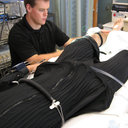Effect of oxidative stress on sympathetic and renal vascular responses to ischemic exercise.
Parole chiave
Astratto
Reactive oxygen species (ROS), produced acutely during skeletal muscle contraction, are known to stimulate group IV muscle afferents and accentuate the exercise pressor reflex (EPR) in rodents. The effect of ROS on the EPR in humans is unknown. We conducted a series of studies using ischemic fatiguing rhythmic handgrip to acutely increase ROS within skeletal muscle, ascorbic acid infusion to scavenge free radicals, and hyperoxia inhalation to further increase ROS production. We hypothesized that ascorbic acid would attenuate the EPR and that hyperoxia would accentuate the EPR. Ten young healthy subjects participated in two or three experimental trials on separate days. Beat-by-beat measurements of heart rate (HR), mean arterial pressure (MAP), muscle sympathetic nerve activity (MSNA), and renal vascular resistance index (RVRI) were measured and compared between treatments (saline and ascorbic acid; room air and hyperoxia). At fatigue, the reflex increases in MAP (31 ± 3 versus 29 ± 2 mmHg), HR (19 ± 3 versus 20 ± 3 bpm), MSNA burst rate (21 ± 4 versus 23 ± 4 burst/min), and RVRI (39 ± 12 versus 44 ± 13%) were not different between saline and ascorbic acid. Relative to room air, hyperoxia did not augment the reflex increases in MAP, HR, MSNA, or RVRI in response to exercise. Muscle metaboreflex activation and time/volume control experiments similarly showed no treatment effects. While contrary to our initial hypotheses, these findings suggest that ROS do not play a significant role in the normal reflex adjustments to ischemic exercise in young healthy humans.


